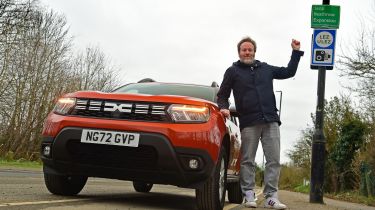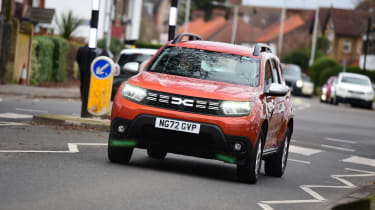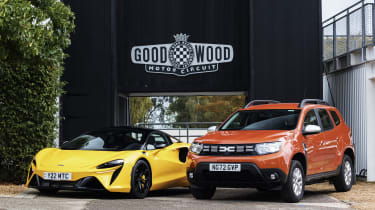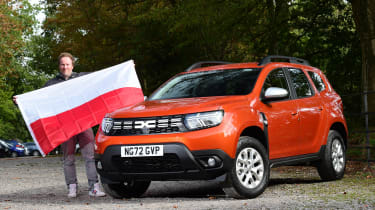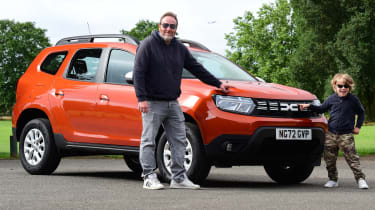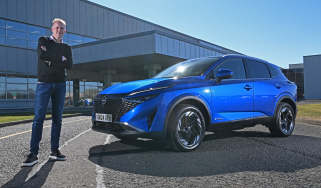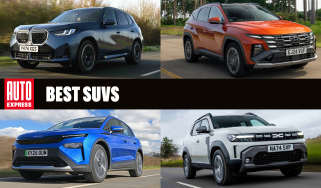Dacia Duster (2018-2024) Expression TCe 130 long-term test: a charming, no-nonsense family SUV
Final report: our small SUV proved perfect for family life in London
Verdict
London’s Ultra Low Emission Zone isn’t going anywhere, so if it impacts you and you need a new car, look no further than the Dacia Duster. Its cheap list price means it won’t break the bank, but there’s so much more to like. It’s a practical and fun-to-drive family car
- Mileage: 5,924
- Economy: 35.6mpg
Life changed for many motorists in Greater London at the end of August last year. The Ultra Low Emission Zone (ULEZ) was controversially expanded to cover all London boroughs, which meant a lot of people had to sell or scrap their non-compliant cars to avoid paying the £12.50 daily fee for driving in the capital.
I live in west London and, while I wasn’t directly impacted by the expansion, some of my neighbours were. One of them has scrapped his car and now drives a Volkswagen Amarok pick-up (go figure!), while another is still currently paying the fee because he refuses to sell his 2009 Mercedes CLK – a car he’s owned from new and has lovingly cared for during that time.
It was while chatting with him that he started asking questions about the Dacia Duster sitting on my driveway, and it suddenly made me realise it’s arguably the perfect ULEZ-busting car.
Used - available now

2023 Dacia
Duster
15,733 milesAutomaticPetrol1.3L
Cash £16,800
2021 Dacia
Duster
52,569 milesManualPetrol1.3L
Cash £10,287
2020 Dacia
Duster
60,148 milesManualPetrol1.3L
Cash £9,906
2017 Dacia
Duster
25,198 milesManualDiesel1.5L
Cash £10,100If you’ve got to change your wheels, you’ve got two options: buy a compliant used vehicle or start shopping around for something brand new. Given that the price of many second-hand cars is still disproportionately high, the Duster’s £14,495 starting price looks quite tempting. It’s one of the cheapest ways to get behind the wheel of a new car and it has the added bonus of being really rather good.
Life with the Duster has been great, and I’m sad it’s now time to say goodbye. I really enjoy the way it drives, and you can even attack twisty roads with some degree of enthusiasm. However, its talents are most noticeable when pottering around a city, because the high driving position yet relatively small dimensions for an SUV mean that it’s easy to thread through traffic and squeeze into most parking spaces without any drama. Yet another reason why it’s such a good ULEZ solution.
I’m often surprised at just how many Nissan Qashqais (of different ages) there are on the school run, yet so few Dusters. The Dacia does almost everything the Qashqai can do for significantly less money.
Longer journeys are a little less comfortable, but I can’t really complain. The Duster performed many long trips around the festive period, including drives to Cardiff, Oxford and Maidstone, all with lots of motorway cruising. Although my wife finds the seats a little uncomfortable after a while, I felt almost as fresh as when I left, which is something I can’t always say about cars costing twice as much.
Another thing I’m really going to miss is the amount of space it offers. I often think of it as a bit like the Tardis from Doctor Who, because it doesn’t appear that big from the outside, yet seems much bigger on the inside. I took the family on a trip to The Tank Museum in Bovington in Dorset, and parked next to an armoured vehicle in the car park. It made the Duster look tiny, yet the Dacia easily had enough space to swallow everything the four of us needed for the trip – including all the extra coats, hats and gloves we had to take to combat the horrendous weather on the day.
Speaking of bad weather, more recently Storm Henk blew down three fence panels in my garden, and I was impressed that the Duster was able to take them to the tip. With the rear seats folded down, I could load the six-foot panels straight into the boot without having to hack them to pieces, making it a far easier job.
Of course, at this price point, there are a few niggles. Admittedly they are minor gripes, but still enough of an issue to be frustrating. Things such as a phone holder that’s too small for my mobile, limited internal storage space and cup-holders that fail to keep drinks in place. However, the biggest annoyance has been temperamental Apple CarPlay connection. It’s plagued me for the entire six months that the Duster has been with us. I’ve tried different cables, but nothing seems to cure the problem.
That shouldn’t detract from what has otherwise been an enjoyable time, though. Whenever there is a small issue, I always just think of the car’s price and it simply doesn’t seem to matter as much any more. So if you’re thinking of getting a new ULEZ-compliant car, cancel that Qashqai order and get a Duster instead.
Dacia Duster Expression TCe 130: third report
Our Duster and a McLaren Artura supercar might seem like an odd pair, but they have one thing in common
- Mileage: 5,002
- Economy: 35.8mpg
Dacia Duster custodian Pete Baiden kindly allowed me to borrow the keys to his long-termer twice in recent weeks so I could get under its Arizona Orange skin. One loan was for a real-world twin-test that you’ll see soon, and another for a comparison that isn’t exactly the most sensible you’ll see in these pages.
That’s because I whisked Dacia’s rugged family SUV away to the Goodwood Motor Circuit, where I’d been invited by McLaren to sample its hybrid supercar, the Artura, on track. The trip got me thinking not only about how little these two cars have in common, but also, the more I thought about it, how both share one specific quality, too.
Differences first, though, and most obviously, there’s the price. In the mid-spec Expression trim and powered by the TCe 130 petrol engine, this Duster with options comes to £20,645. For the price of one Artura, you could buy yourself a fleet of nine Dusters, and you’d still have enough money to buy enough fuel to drive them, at the current 35.8mpg we’re achieving from our car, a combined total of 17,500 miles.
But then the Duster doesn’t have the drama of the Artura. Swan-wing doors open up to reveal the McLaren’s stunning driver–focused cabin, trimmed in sumptuous materials. You sit low, there’s a fabulous view ahead, and the seats hold you firmly in place. The Duster has a big rear bench that holds two child seats, though, so you can bring friends and family along for the ride.
Out on track, the Artura is sublime. On the damp circuit, the steering’s detailed feedback lets you know exactly how much grip there is left to exploit. That gives me the confidence to explore the full 671bhp potential of that 3.0-litre twin turbo V6/electric hybrid powertrain. I barely dare look at how fast I’m going at the end of the Lavant straight, but hard braking shows stunning stability, even while trail braking all the way through to Woodcote’s second apex.
The Duster’s 1.3-litre turbo, on the other hand, makes 127bhp, and its performance is fine. The steering is light and a bit vague, but the ride is comfortable and it’s surprisingly pleasing to thread along a British B-road.
But despite all the clear differences, I can’t help feeling that these two models actually have a very admirable quality in common.
Some cars try too hard to do too much, and ultimately become such a compromise that they fail to offer any outstanding qualities. But the Duster and the Artura have a specific purpose and they both nail it. The Artura sets out to be focused on pure performance, a car which marries the very best of petrol and electric tech to become one of the best supercars money can buy.
The Duster’s aim is very different, but no less valid. It’s a car with no claims to be a premium product, nor one which pretends to be sporty. Instead, it puts value for money above all else – and as such, it’s one of the cheapest cars of its type on the market. That this rugged hatchback achieves as much while offering loads of space, an easy-going driving experience and plenty of standard kit makes it hard to knock.
From a tech point of view, the best car here is obvious: the Artura is a masterpiece of engineering. But if I had to decide which car was better at filling its intended brief? That’s a much tougher call. One thing might settle it: those who can afford the Artura are spoiled with quite a staggering selection of brilliant alternatives, be it from Ferrari, Porsche or Maserati. If you have 20 grand to spend on a new car, however, what else is there to choose that can do everything the Duster does?
Dacia Duster Expression TCe 130: second report
The Dacia Duster SUV is a top-10 hit in Poland
- Mileage: 3,501
- Economy: 36.0mpg
No the flag isn’t wrong. While Dacia is a Romanian brand, it has quickly spread throughout Europe in recent years. And I was stunned at just how popular it has become during a trip around Poland with my family.
If you think the Dacia Duster is common on the road here, that’s nothing compared with Poland. They are everywhere! I didn’t see many Sanderos or Joggers, but the rugged small SUV was commonplace. They were especially popular in the capital Warsaw and other big cities I visited, such as Gydnia and Wroclaw, but there were also plenty in the countryside and smaller towns.
I looked up the sales figures in Poland and, lo and behold, it’s in the top 10. The Toyota Corolla took top spot, but the Duster wasn’t too far behind, in sixth place. In fact, it’s the second-most popular SUV, sitting just below the Kia Sportage. That’s in stark contrast to the UK, where the Duster doesn’t get close to the top 10 and is a long way down the list of the best-selling SUVs.
One of the reasons the car has to be so popular in Poland is the price. In the UK, the Duster’s already considered to be quite inexpensive with a starting price of £17,295, but in Poland it’s even more of a bargain. The range starts at zl79,900 (just over £15k), more than £2k less than what we would pay here. If you live in Poland and want a new car, you’d struggle to match the Duster’s abilities and space for that kind of money.
It was while in Poland that I also found out the Duster isn’t just being used as a daily runabout. One of my wife’s friends from school, Agnieszka, has converted her Duster into a camper for a road trip around Europe. She left in May and has so far driven more than 15,000km in 13 countries.
She originally bought the Duster to use for her job as an architect, as she regularly drove to building sites and over rough terrain. The low price meant she could pay for the car outright, meaning there was no need to take out a financing option. It was during this time she realised it would be great to leave everything behind and head off on an adventure, and the Duster would be the perfect car for the job, because of its relative simplicity and rugged nature.
The converted Duster allows Agnieszka to get off the beaten track and be closer to nature. It’s also far more economical than a campervan, and allows her to get much further on a tank of fuel – a vital attribute when covering the amount of miles she has.
Most importantly though the Duster has been reliable. Despite everything she’s thrown at it, it’s never gone wrong bar a minor ventilation issue that was easily fixed. You can learn how Agnieszka converted the Duster for the trip and follow her exploits on her YouTube channel.
Back in the UK, my Duster has been performing admirably. I’ve been racking up the miles in recent weeks with regular trips to Oxford from my west London home, and proving that it’s a perfectly capable performer on motorways.
I initially feared the 1.3-litre petrol engine might struggle in a car of this size, but the power arrives relatively low in the rev range. Overtaking is never a chore; you can simply drop down a gear, put your foot down and the car will instantly accelerate. The engine can sound a bit rough at times, but it’s not intrusive and you soon learn to live with it.
I still have a bit of a love-hate relationship with the cabin. Some parts seem basic, but it feels perfectly robust – useful in a family car. Get past the fact the Duster isn’t designed to be a luxury car, and you’ll appreciate what you get for the money; I certainly have.
Dacia Duster Expression TCe 130: first report
The spacious and well specced Dacia Duster SUV is proving to be a family favourite
- Mileage: 3,017
- Economy: 38.9mpg
The second-generation Dacia Duster has been on sale since 2017 and in many ways it’s starting to show its age, but a mid-life facelift arrived last year and was then quickly followed by another update as the budget Romanian brand revised its logo.
This latest refresh has given the Duster a distinctive new look, with the company’s ‘link’ logo, which consists of the letters D and C merging in the middle, dominating the car’s grille. It’s one of the first things people notice about the Duster, with my dad even thinking it was an all-new car. It’s amazing that such a subtle redesign can have such an impact.
Even my son Hugo has been taken in by the Duster’s charms. He’s at the age where he’s starting to really get into his cars and he usually talks about Lamborghinis and Porsches, but he loves the way the Duster looks and always asks if we can use it whenever we have to leave the house.
The fresh look otherwise hides a car that’s pretty much unchanged since its launch, but that’s not necessarily a bad thing. We loved the Mk2 Duster when it first arrived and our opinion hasn’t really changed. It’s a car that offers a lot for its rather modest price tag. The model that’s joined our test fleet is a mid-spec Expression TCe 130, which costs just £19,695. It can be hard to find any new car on sale for less than £20,000 these days, let alone one that offers a fraction of the amount of kit the Duster has, or one that drives as well and has anywhere near the amount of space.
Electric front and rear windows, automatic headlights, a rear parking camera, automatic air-conditioning, an eight-inch touchscreen and four USB ports (two in the front and two in back) are all included as standard, so it’s not exactly short on creature comforts.
However, where the Duster really excels is practicality. It’s a perfect fit for my family of four, thanks to a big boot that’s more than capable of taking a buggy and a couple of bags, and plenty of interior space in the airy cabin. Two child seats fit in the back without having to squeeze them in, and there’s enough legroom so that the children don’t kick the back of the seats in front.
While the interior quality is best described as cheap and cheerful, and the hard plastics can be easily scratched, in general it’s perfect for a family because it offers relatively low maintenance. The plastic trim is easy to wipe down without leaving any stains, and the cloth seats look as good as new after a quick sponge.
The Duster is also quite pleasant from behind the wheel, mainly thanks to the fact it’s much lighter than it looks. Weighing in at around 1,300kg means that it handles well on a twisty road, with body roll that’s noticeable as opposed to intrusive. The 1.3-litre petrol engine is smooth and relatively economical, averaging almost 39mpg over the 3,000 miles I’ve covered.
But it’s not all good news, because a few early niggles have started to turn into frustrations, and by far the biggest is the problematic Apple CarPlay connection. The Duster doesn’t come with a built-in sat-nav, so my reliance on CarPlay is even greater than in some other cars, but the connection keeps dropping. A few times I’ve been happily driving along, following the route guidance, and it randomly disconnects, leaving me blind as to which turn I should be taking next.
It’s wired, so you’d think it would be pretty foolproof, but it keeps on happening. Simply unplugging it and plugging it back in again fixes it, however it’s not something you want to keep doing while driving. I’ve never had a problem with this particular cable in other cars, so I can’t see how it’s an issue at my end, but I will test the connection with some other cables to see if the problem persists.
I’ve also had an issue with the carpet mat getting stuck on top of the clutch pedal. The first time it happened, I thought there was a bigger problem because the clutch was very slow to release, meaning I had to jam my foot underneath to lift it up. It was then that I realised that it was the mat holding the pedal down. I’ve clipped the mat back in place, but if it happens again I’ll have to remove it altogether.
| Model: | Dacia Duster Expression TCe 130 4x2 |
| On fleet since: | July 2023 |
| Price new: | £19,695 |
| Engine: | 1.3-litre 4cyl petrol, 128bhp |
| CO2/tax: | 141g/km/£215 (1st year) |
| Options: | Arizona Orange metallic paint (£650), spare wheel (£300) |
| Insurance*: | Group: 19/Quote: £544 |
| Mileage: | 5,924 |
| Economy: | 35.6mpg |
| Any problems? | Apple CarPlay connection |
*Insurance quote from AA (0800 107 0680) for a 42-year-old in Banbury, Oxon, with three points.
